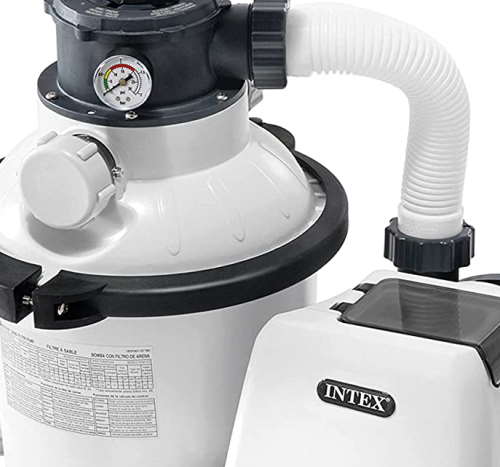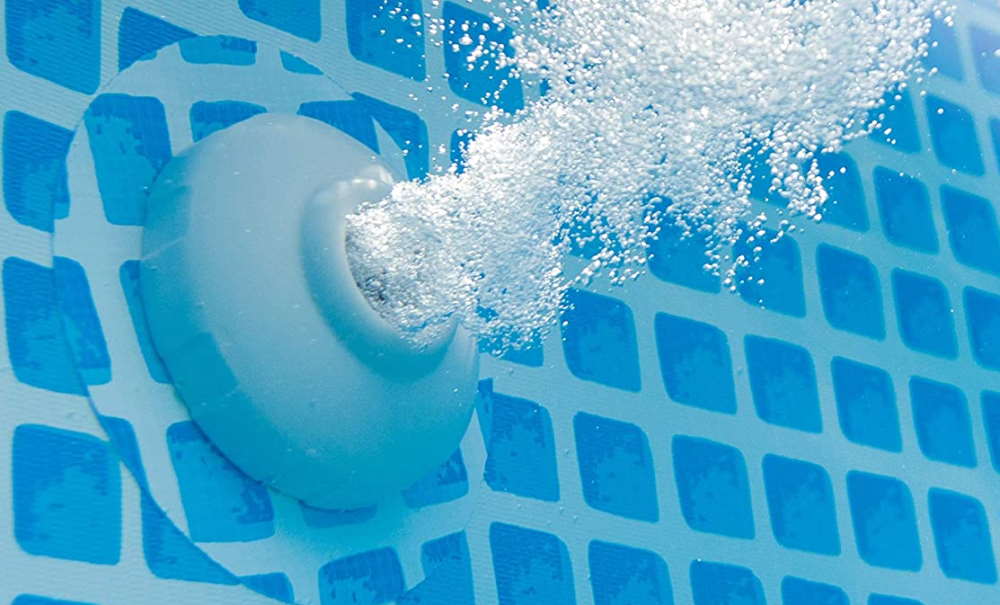An above ground pool pump is a device that is used to circulate water through an above ground swimming pool and filter out debris and other contaminants. In order to keep the water clean and safe for swimming, an above-ground pool pump needs to be installed and maintained correctly. The pump is typically connected to the pool filter and other components of the pool circulation system. It pulls in water from the pool, passes it through the filter, and then pushes it back out into the pool.
A pool pump circulates the water in the pool, allowing the pool filter to catch any debris or dirt that may have made its way into the pool. It also helps break down chemicals like chlorine to keep the water clean.
Different Pool Pump Types
In-Ground Pool Pump – An in-ground pool pump is a type of pool pump specifically designed for in-ground pool installations. It is typically larger and more powerful than an above-ground pool pump, with higher pressure and flow rates. The pump is typically installed underground, often in a vault or other sealed enclosure, and is connected to the pool’s plumbing system. In-ground pool pumps are designed to circulate and filter water from the pool, as well as maintain the chemical balance of the pool.
Above-Ground Pool Pump – An above-ground pool pump is a type of pool pump designed explicitly for above-ground pool installations. They are typically smaller and less powerful than in-ground pool pumps, but are still capable of providing adequate circulation and filtration for the pool. Above-ground pool pumps generally are installed near the pool, usually in a sealed enclosure, and are connected to the pool’s plumbing system. They are designed to circulate and filter water from the pool, as well as maintain the chemical balance of the pool.
How To Install Above-Ground Pool Pump?
- Install the pump on a flat, level surface. Make sure that it is placed away from any debris or dirt that may interfere with the operation of the pump.
- Connect the pump power cord to a GFCI outlet.
- Attach the pump to the pool’s filtration system.
- Connect the suction hoses from the pool to the pump.
- Connect the discharge hoses from the pump to the pool filter.
- Make sure all connections are secure and tight.
- Connect the pump to a timer and set the desired run time.
- Plug in the pump and turn it on.
How To Install In-Ground Pool Pump?
- Determine the best location for the pump. It should be in an easily accessible area, away from debris, and close to the pool’s main drain.
- Dig a hole and set the pump in the bottom. Make sure the pump is level and secure.
- Connect the pump to the electrical wiring. Make sure all connections are secure and tight.
- Attach the suction hoses from the pool to the pump.
- Connect the discharge hoses from the pump to the pool filter.
- Connect the pump to a timer and set the desired run time.
- Plug in the pump and turn it on.
How Does A Pool Pump Help Keep Water Safe And Clean?
A pool pump helps keep the water clean and safe by circulating the water, which allows the pool filter to capture and remove debris, contaminants, and bacteria that can cause health issues. By circulating the water, it also helps keep the water temperature consistent, which prevents algae growth.
Pool Pump Size And Flow Rate
What is the best flow rate pool pump for about 2000 gallon-sized pool?

For a 2000-gallon pool, you should have a pool pump with a flow rate of around 600+ gallons per hour. A pool pump with that flow rate should be enough to keep your pool water in shape. Keep in mind that the pump should be powered on each day – for about 3 hours minimum. That is enough to keep your pool clean and properly filtered.
What is the best flow rate pool pump for about 1000 gallon-sized pool?
For a 1000-gallon pool, a 400-gallon per hour flow rate pump is recommended. This pump should be powered on each day for about 3 hours also. Water circulation (with proper chemical maintenance) is essential for crystal-clear water in your pool.
Don’t forget to change the pool pump filter regularly. It is extremely important to replace your pool pump filter regularly. Pool pump filters are responsible for removing dirt, debris, and other contaminants from your pool water. If the filter is not changed on a regular basis, it can become clogged and reduce the effectiveness of the pump and circulation system, leading to cloudy and poor-quality water. Additionally, a clogged filter can cause the pump motor to overheat, leading to costly repairs.
Conclusion
A pool pump is necessary for circulating the water in an above-ground pool, and it helps keep the water clean and clear. The type of pump you choose will depend on the size and type of your pool. Typically, for an above-ground pool, you will need an above-ground pump also.
Finally, for those who have a 2000+ gallons pool, and family who like to swim often, we recommend choosing a pool pump with a sand filtration system. Sand filters are a great choice for above-ground pools because they are relatively inexpensive, easy to maintain, and effective in filtering out dirt and debris. Sand filters work by circulating pool water through sand housed inside the filter. The sand traps dirt, debris, and other particles and then the clean water is returned to the pool.
